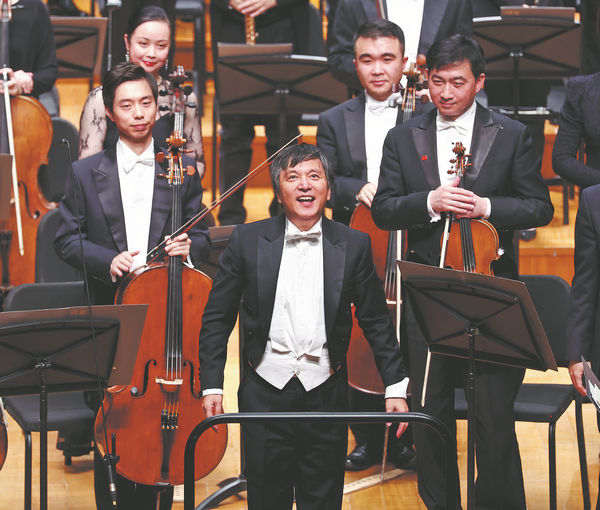

"I have a long and deep relationship with the China National Symphony Orchestra and now I feel like coming home," says Shui, who began his conducting career with the orchestra in 1985. The China National Symphony Orchestra was established in 1956 and has a long history of performing classic Chinese music, especially patriotic pieces written during wartime, such as the Yellow River Cantata by Xian Xinghai.
"I still have vivid memories of working with the great musicians of the orchestra. It was a valuable experience working and learning with legendary conductors like Yan Liangkun (1923-2017), Li Delun (1917-2001) and Han Zhongjie (1920-2018). I took the bus to Han's home to study almost every week," Shui says.
On Jan 14, he conducted the China National Symphony Orchestra for a concert in Beijing, featuring baritone Liao Changyong. They performed Mahler's Symphony No 1 in D Major and Lieder eines fahrenden Gesellen (Songs of a Wayfarer), a song cycle by the composer for which he also wrote the lyrics.
The concert not only helped reconnect Shui and the orchestra after almost 40 years, but also gave the conductor a new perspective on the orchestra.
"I was surprised to see so many young musicians, who impressed me during the rehearsals with their youthfulness, energy and passion for music," he says. "When the orchestra invited me to be its artistic adviser, I agreed immediately. I have many ideas about music, which can be fulfilled by working with them. I am very excited."
The new season under Shui is expected to herald a commitment to artistic innovation and cultural exchange. Audiences can anticipate a diverse repertoire of both classical masterpieces and contemporary work in reflection of the orchestra's dedication to preserving tradition while embracing modern influences.
Concerts will be held to commemorate Austrian composer Anton Bruckner's 200th birthday. On Sept 1, Shui will lead the national orchestra for the opening of the new season at the Beijing Concert Hall with a performance of the composer's Symphony No 7 in E Major. The legacy of Austrian-American composer Arnold Schoenberg will also be celebrated, with concerts dedicated to the composer, who is not as familiar to Chinese audiences.
"The China National Symphony Orchestra is one of the few orchestras in the country that has its own chorus. So we will put on shows making use of them. We are planning a concert featuring Haydn's Die Jahreszeiten (The Seasons)," says Shui. It is slated to be performed on March 29 at the Beijing Concert Hall, and will feature American conductor David Hoose, soprano Xu Lei, tenor Liang Yufeng and bass Xu Yang.
In celebration of the 75th birthday of the founding of the People's Republic of China, a new symphony has been commissioned by 10 Chinese symphony orchestras titled Rising Sun From the East. Composed by Li Bochan, it will be premiered by the China National Symphony Orchestra on Sept 13 at Beijing's National Centre for the Performing Arts, under the baton of Jing Huan.
Guest conductors are also a highlight of the new season. Marking the 60th anniversary of the establishment of China-France diplomatic relations, a concert will be staged in Beijing on Oct 5 under the baton of composer-conductor Tan Dun. The orchestra will play pieces including Tan's Passacaglia: Secret of Wind and Birds, and French composer Ravel's Bolero. Featuring suona (a traditional Chinese wind instrument) player Liu Wenwen, the concert will include the popular folk piece, A Hundred Birds Worshipping the Phoenix.
Spanish conductor Josep Pons will perform in a concert marking the 150th anniversary of Ravel's birth, on Jan 18. Audiences will be able to enjoy pieces including Pavane pour une infante defunte (Pavane for a Dead Princess) and Rapsodie espagnole (Spanish Rhapsody), the first piece Ravel composed specifically for an orchestra.